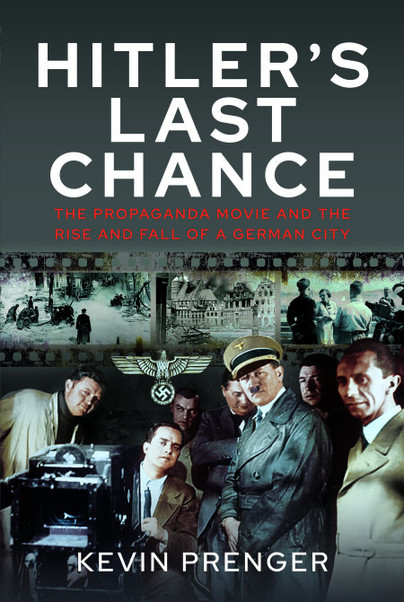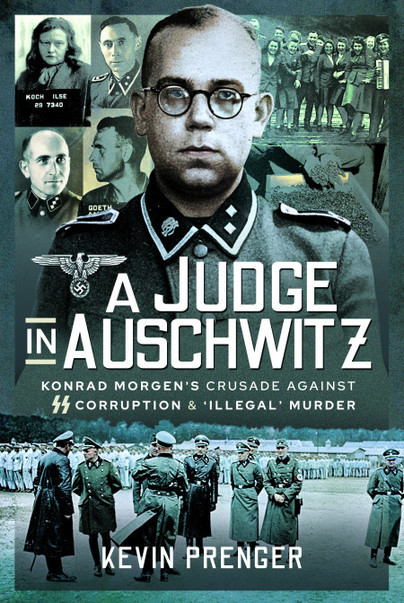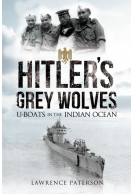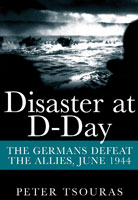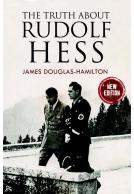Hitler's Last Chance (Hardback)
Kolberg: The Propaganda Movie and the Rise and Fall of a German City
(click here for international delivery rates)
Need a currency converter? Check XE.com for live rates
| Other formats available - Buy the Hardback and get the eBook for £1.99! | Price |
|---|---|
| Hitler's Last Chance eBook (27.5 MB) Add to Basket | £6.99 |
The war in Europe was reaching its cataclysmic final months with Germany surrounded on all sides. Most of Hitler’s forces had been driven from Poland by the Red Army and the Soviets were poised a short distance from Berlin, while the Western allies, having repulsed the Führer’s Ardennes offensive, were preparing to cross the Rhine.
More than ever Hitler needed his people to stiffen their resolve for the coming onslaught. To demonstrate what will be expected of the German people, and what they could achieve if they refused to acknowledge defeat, a major feature film would be shown, featuring the legendary place which held out against Napoleon when he invaded Prussia in 1806 – the city of Kolberg.
After crushing the Prussian Army in 1806, French forces swept into the Prussian province of Pomerania. One by one most Prussian fortresses surrendered, mostly without offering any resistance, but Kolberg stood firm. The small and weakly-fortified city held out for almost four months despite being surrounded by Napoleon’s forces, with Major von Gneisenau organising a citizen’s militia to aid the army in its defence. Though much of the city was blasted into ruin, Kolberg remained in Prussian hands until the war with France ended with the signing of the Peace of Tilsit, by which time its defence had become legendary.
Even though the Third Reich was literally entering its death-throes, in attempting to reproduce the siege of Kolberg on film, thousands of experts, extras and horses were taken from the war effort by the Reich Minister of Propaganda, Joseph Goebbels. The film’s emphasis was to show how civilians and the military can work together to save Germany – just as Kolberg had been saved from the French. The result has been stated to be the most expensive feature film ever made in Germany.
This book examines the dramatic conditions under which the film was produced, and the scale of the resources needed to do so, followed by its first showing on 30 January 1945. All Goebbels’ efforts, though, were to no avail, as the film never went on general release. A month later, as the author reveals, Kolberg found itself under siege once again, but this time, after bitter house-to-house fighting, it fell to the Soviets in just two weeks.
“A book about an obscure Nazi propaganda movie proved an entertaining diversion from the usual military history books.”
Historical Miniatures Gaming Society
Read the full review here
I started reading this book with the idea that it was only about the Nazi propaganda film "Kolberg", conceived by Goebbels and directed by veteran director Veit Harlan, during the last two years of the war. In reality this book by Kevin Prenger, Dutch historian, is much more. It is the story of the city of Kolberg in the Napoleonic wars. The episode of the siege of the city by the French, portrayed in the film, is precisely from that era. But it is also the story of how that same city developed in times of peace as a spa and tourist establishment. How it was a tourist destination for German Jews and how it suffered (like all of Germany) from anti-Semitism when Hitler came to power.
Andrea Di Bernardo, Goodreads
But it is a book that investigates and weaves its plots deeper, bringing the testimonies of those who lived there and had to leave in the "Gotterdammerung" of March 1945, and of those who fought there. The central part is certainly dedicated to the film with stories and curiosities about the director and the cast, with interesting stories about their past and their career after the end of the war.
There is no doubt that the film did not achieve the desired success, nor the political message, due to the late release (started in 1943 and with enormous production efforts and expenditure of money and material!) managed to reach few of the German public , who in the recent past had also been very sensitive to the message conveyed by the images and cinema as demonstrated by the successes of Leni Riefenstahl's works.
The book, well researched (as evidenced by a large bibliography) and very exciting, sheds light on a city and a film which, without success, we can say, recall an episode from the past (and that too is told as it happened in reality and not in the myth that the Nazi regime made of it) to push the German people to emulate its example in the coming battles that slowly approached the reich from the east.
At the same time it can be said that it also sheds light on a whole lost world (Kolberg today is Poland, now Kolozbreg) which, like a mocking warning to the most exasperated nationalism, highlights how propaganda can do nothing against force of arms.
My rating is five stars, the book is well written, very easy to read and not "academically" boring, well balanced and full of information.
A book that made me think, and one I would happily recommend to others.
The History Fella
Read the Full Review Here
As featured in
The Bookseller, Jan 23
Q&A with the author:
Historiek.net
https://www.tracesofwar.com/news/11774/The-Nazis-most-expensive-and-least-watched-propaganda-film.htm
ARTICLE:
Traces of War, January 2021
https://www.tracesofwar.com/articles/6984/Evacuation-and-fall-of-the-German-city-Kolberg.htm
REVIEW:
https://www.tracesofwar.com/books/5840/Hitlers-Last-Chance-Kolberg.htm
ARTICLE:
Traces of War, January 2021
https://www.tracesofwar.com/articles/6984/Evacuation-and-fall-of-the-German-city-Kolberg.htm
REVIEW:
https://www.tracesofwar.com/books/5840/Hitlers-Last-Chance-Kolberg.htm
About Kevin Prenger
Kevin Prenger is a writer of World War II history, living in his native Netherlands. He is the chief editor of the website TracesOfWar.com and also contributes to the Dutch online history magazine Historiek.net. His previous works include War Zone Zoo, the history of the Berlin zoo during World War II and Christmas under Fire, 1944. A Judge in Auschwitz, previously published in Dutch and Polish, is his third book translated in English.
A Judge in Auschwitz Konrad Morgen's Crusade Against SS Corruption & 'Illegal' Murder (Hardback)
In autumn 1943, SS judge Konrad Morgen visited Auschwitz concentration camp to investigate an intercepted parcel containing gold sent from the camp. While there Morgen found the SS camp guards engaged in widespread theft and corruption. Worse, Morgen also discovered that inmates were being killed without authority from the SS leadership. While millions of Jews were being exterminated under the Final Solution programme , Konrad Morgen set about gathering evidence of these ‘illegal murders’. Morgen also visited other camps such as Buchenwald where he had the notorious camp commandant Karl Koch…
By Kevin PrengerClick here to buy both titles for £42.00







